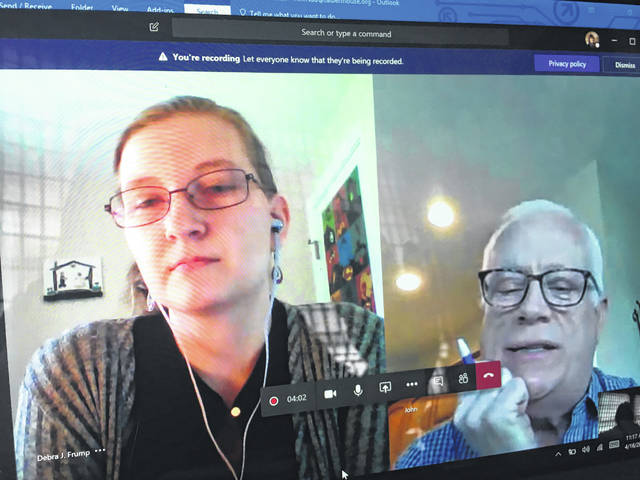
Ashley Powell’s morning routine has not changed much. She still gets up, has breakfast, and prepares for her day counseling clients.
What has changed, though, is where the Beech Acres Parenting Center child mental health therapist is working – from home.
“Coronavirus has certainly changed things a bit,” Powell said. “We’ve had to figure things out and work a little differently. It’s definitely a learning experience for everyone.”
Powell is one of many therapists across Ohio adjusting to using telehealth options for counseling, thanks to the state loosening rules on telehealth sessions. The changes allow therapists and counselors to meet with clients online, by phone or other electronic alternatives to prevent the virus’s spread.
The ability to expand telehealth options excited Colleen Chamberlain, executive director of Mental Health Recovery Board Serving Warren & Clinton Counties.
“As the implications of the coronavirus pandemic and stay at home restrictions started impacting daily life in Ohio and across the country, my biggest concern was continuity of care for every resident in treatment and recovery,” Chamberlain said.
“When the state expanded telehealth rules, it helped to reduce barriers to treatment. Care would continue uninterrupted as persons have access to their treatment provider through electronic means. In-person assessment that is usually required can also be done remotely. This removes a great hurdle for people seeking services. The agencies we contract with, such as Beech Acres and Talbert House, have adapted well.”
On a “normal” day, Powell said, she would be working as part of a classroom team. But when school building closed and classes went online, Beech Acres – like many agencies serving clients with mental health and addiction diagnoses – had to figure out the best ways of meeting counseling needs. Telehealth options are generally restricted under state rules, but they had to open up to keep counseling going.
“I’m actually enjoying it, despite the challenges of working online,” Powell said. “We do scavenger hunts with the kids and work with families to ensure they are keeping up with their work, even though we aren’t in the classroom.”
Powell said her clients are also liking the telehealth experience. “They are working through the changes, too, but parents are generally receptive and happy for the continuity of care in a difficult time like this.”
Debra Frump agrees. The clinical counselor for Talbert House says using telehealth has been “an adjustment”, but her clients have liked the format, too.
“The ideal is certainly face-to-face counseling but being in a place where the client is comfortable like their own home also opens the door to feeling more at ease than an office,” Frump said.
For Frump, her routine has changed a lot. It is still necessary to make some time to complete the paperwork involved. And working from home where family can sometimes create distractions can be challenging. But Frump says the initial differences in her work routine have given way to a good level of comfort, too.
Frump usually works from Talbert House’s Lebanon and Wilmington offices. Sometimes she has driven between offices in the same day to meet with clients. But with telehealth, she can be at home and meet clients faster, even if they are in different locations.
“It does make going from a client in Lebanon to a client in Wilmington that much easier,” she said. “The flexibility of telehealth has been really helpful for clients and staff, I think.”
Frump said she had heard from some clients that they were nervous about working with her through telehealth.
“I’d hear things like ‘I can’t do this through telehealth’ or something like that,” she said. “So for those who have trouble getting online, we still meet by phone if that’s more comfortable for them. Many clients, though, have adjusted well to the video chats, too.”
Both Frump and Powell said they have regular opportunities to share their experiences with colleagues. “We learn from each other’s experiences to make things better and easier for our clients,” Powell said.
As for the future of using telehealth more frequently, Powell says it may open some doors for counselors and therapists.
“We’re learning a lot about using telehealth, and who knows. When this crisis is behind us, we will probably take some stock of the lessons learned and evaluate if and how to continue using telehealth. It may open some new options.
“We’ll see, won’t we?”
John Cummings is Deputy Director of Communications, Mental Health Recovery Board Serving Warren & Clinton Counties.


